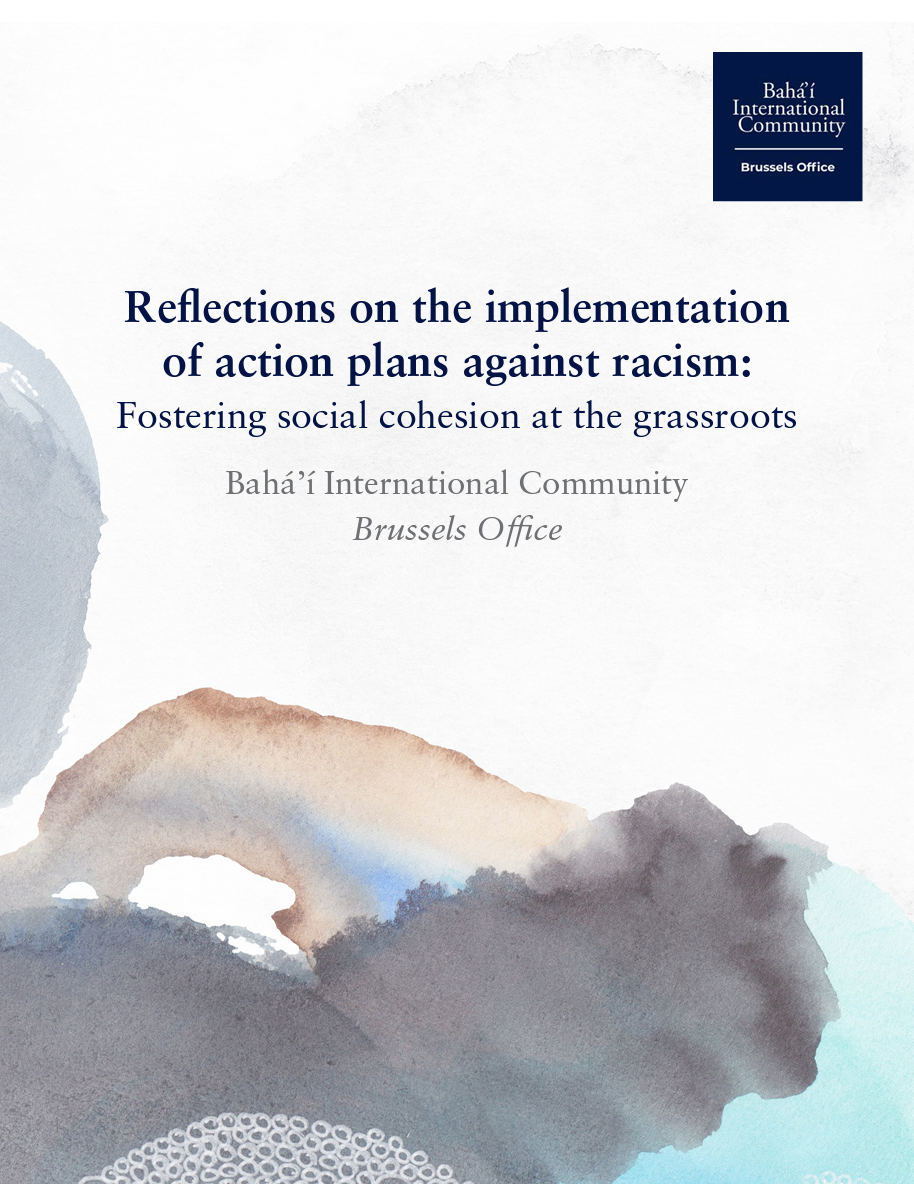Reflections on the implementation of action plans against racism: Fostering social cohesion at the grassroots
This statement was delivered to the conference on the implementation of national action plans against racism
One of the most pressing questions facing Europe today is how to overcome racial and other forms of prejudice. The recent policy initiatives launched by the European Union towards this, such as the EU Anti-Racism Action Plan (2020-25) are a significant step to guide endeavours to make Europe a place where populations of various backgrounds feel they belong and have a role to play in contributing to its progress. The Bahá’í International Community warmly welcomes all the efforts undertaken to implement the action plan, including at the level of Member States through the adoption of national action plans.
As the action plan points out, deep-seated prejudices cannot be unrooted from the hearts and minds of individuals—much less from the structures that underpin society and the institutions that serve it—through anti-racism legislation alone. In that regard, the action plan outlines several crucial elements in section 2.2 “Beyond EU legislation - doing more to tackle racism in everyday life” and in section 3 “Structural racism - tackling the underlying problem”. With regard to the heading “Mobilising the regional and local levels for meaningful impact on the ground” in section 3.2, the Bahá’í International Community would like to share additional considerations, which relate to fostering social cohesion at the grassroots.
Racism is perpetuated and thrives when populations operate in social contexts in which they merely live side by side without opportunities for meaningful interaction, as is often the case in European cities or towns. An irreplaceable component of any strategy to overcome racism requires giving attention to the broader dynamics of community life in neighbourhoods. Within neighbourhoods, individuals from various backgrounds need opportunities to come together to define and engage in shared projects that contribute to its moral, intellectual and material wellbeing. In sum, residents of a neighbourhood or village nurture a sense of belonging and build up the resolve to eradicate prejudice when they are able to cooperate, contribute and become protagonists in their local reality. It is through such co-participation that diverse perspectives are encountered, meaningful bonds are forged, and the dignity and capabilities inherent to all are made manifest. In parallel, residents become more conscious of the lived experiences of discrimination that their neighbours face.
Although European and national institutions do not directly interact with the grassroots, they have a fundamental role in encouraging and shaping interactions at that level, for instance by working closely with municipal authorities. At the same time, they would want to learn from the grassroots and ensure that relevant insights inform national or European policy.
Among the numerous considerations that could be highlighted, we would like to mention a few.
At the most fundamental level, institutions need to see the populations they serve as people endowed with capacity and as protagonists of change. Diverse perspectives, practices, languages and cultures should be considered a source of strength that a community can learn to harness, rather than a deficit that needs to be addressed or a challenge to be managed from above.
One practical implication is that local populations would naturally be included in the planning and policymaking processes of their municipalities. Plans would be co-created with the population, ensuring such plans respond to the actual needs of the community while fostering a sense of ownership and commitment among its members.
To facilitate this, there is a need for consultative spaces, regular rather than one off meetings, where a continued conversation between local authorities and the population can unfold. Care ought to be given as to how these spaces can elicit participation, foster listening and build trust. A cross-section of the population should feel welcome in these spaces and be actively encouraged to attend. Attention ought to be paid to whose voices are being heard and that interventions are not weighed against preconceived judgments, but on the extent to which they provide constructive insights. Furthermore, reducing individuals to “representatives'' of specific populations obscures the diversity of experiences and perspectives that exist among any given group. Efforts must be made to elicit the participation of individuals that might not be known as representatives or might not easily access these spaces, in particular the youth.
The above are just a few initial considerations we would like to offer for engaging communities in ways that foster participation and encourage the building of bonds that will contribute to efforts to eradicate racial prejudice.
